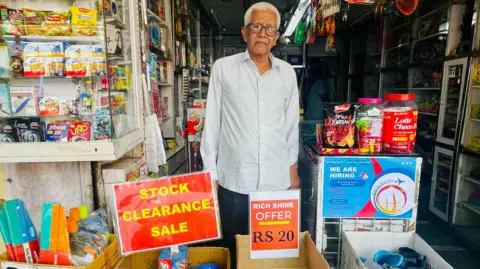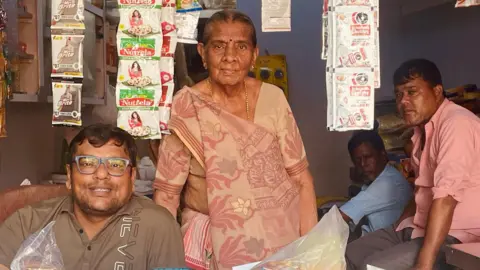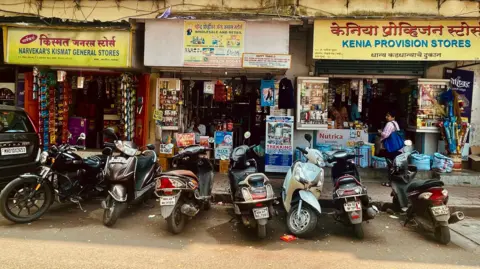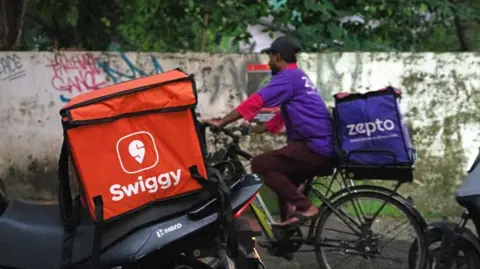Are 10-minute online deliveries killing the Indian corner shop?
 Nikhil Inamdar
Nikhil InamdarThe corner shop Ramji Dharod has manned for over six decades is now on the brink of closure.
The store sits in a bylane in a busy shopping precinct in the central Indian city of Mumbai and has served the community for 75 years.
Dharod began coming to the shop with his father when he was just 10. These days, he mostly sits idle, waiting for an occasional customer to walk in.
Behind him, cardboard boxes of unsold biscuit packets and snacks show a "stock clearance sale" sign posted on them.
"I wouldn't get a minute to breathe a few years ago, but now I rarely get anyone coming," says the septuagenarian wryly. "They are all shopping online. I've decided to retire and down the shutters."
As 10-minute online deliveries by "quick commerce" apps like Zomato, BlinkIt and Zepto pervade urban India, hundreds of thousands of neighbourhood stores across cities have closed down.
A lobby group of consumer product distributors estimated that number to be 200,000 last October, while the municipal body of the southern city of Chennai estimated 20% of small grocers and 30% of larger departmental stores had shut down in the city in the past 5 years.
 Nikhil Inamdar
Nikhil InamdarSunil Kenia who runs a provision store right beside Dharod's shop says he's still in business only because his family owns the shop. Those on rent are no longer able to stay afloat, he says.
"It started going downhill after the Covid lockdowns. Business is at 50% of what we did before the pandemic," Kenia told the BBC.
Most of his revenue now comes from wholesale customers – hawkers or those selling street-side snacks. The retail customer has all but "vanished", he says, because of the convenience of mobile deliveries.
Mumbai-based graphic designer Monisha Sathe is among the millions of urban Indians who've stopped their weekly run to the market because of the ease of quick commerce.
"Lugging groceries back home was a big pain," says Sathe. And occasionally, when she took out her car, navigating narrow market lanes and finding a parking slot would be a challenge.
Sathe says she misses the human interaction she had with the grocers and vegetable vendors and even the variety of fresh produce on sale – but for her, the balance still tilts in favour of online deliveries because of how much easier it has made her life.
A recent survey by consultancy PwC shows some 42% of urban consumers in India's big cities think like Sathe, especially preferring quick delivery for their urgent needs. And these shifts in buying behaviour have led to three out of 10 retailers reporting a negative impact on their business, with a 52% drop in essential goods sales.
 Nikhil Inamdar
Nikhil InamdarBut to what extent is quick commerce really hollowing out the Indian high street?
There's no doubt general trade – which includes grocery stores, corner shops and even big retail outlets – has come under threat, says Ankur Bisen, a partner at Technopak retail advisory. But at least for now "quick commerce is still a three-four city story", he says. Nearly all of their sales come from these cities.
Lightning fast deliveries bucked the global trend and became successful in India largely due to a large concentration of people staying in urban clusters.
They are serviced through low-rent "dark stores" - or small shops dedicated to delivery and not open to the public - in densely populated areas, enabling economies of scale.
But the precarious nature of demand and fragmented demographics of smaller towns could make it expensive for quick commerce players to expand and make money beyond the metros, says Mr Bisen.
There's little doubt though that these online deliveries will disrupt trade in the longer run.
Bain and Company expects quick commerce to grow at over 40% annually through to 2030, driven by expansion across "geographies".
And this has made traditional retail nervous.
Trade organisations - like the Confederation of All India Traders, or the All India Consumer Products Distributors Federation which calls itself the voice of India's 13m retailers - have made urgent and repeated pleas to the government against this breakneck expansion.
They allege that these companies are using billions of dollars in venture capital funds to engage in anti-competitive practices like "predatory pricing" or "deep discounting" which has further distorted the playing field for mom-and-pop shops.
The BBC spoke to several small retailers who shared these concerns. Mr Bisen too agreed there's evidence of such practices in the clusters that quick commerce companies operate.
 Getty Images
Getty ImagesSwiggy, Zepto and Blinkit, who primarily control this market, did not agree to comment on the BBC's queries on these allegations.
But a source within one of the quick commerce companies told the BBC the discounting was done by traders on the platform and not by them.
The source also said that contrary to the binary narrative of the "big guy versus small guy", online deliveries were solving real-world challenges for people for whom going to the market was a "traumatic" experience.
"Think of women or senior citizens - they don't want to be harassed or navigate potholes and traffic," the source said. "Also consider the small brands that sell on our platform - they never get shelf space in physical shops where only the big names are displayed. We've democratised the market."
Analysts say, the sheer diversity of India in terms of its stages of development, levels of income and infrastructure will mean that in the end all retail models - small corner shops, organised big retailers and quick commerce platforms - will cohabit in the country.
This is not a "winner takes all market", says Mr Bisen, giving the example of e-commerce which came into India in 2010 and was meant to sound the death knell of local retailers.
Even after all these years, only 4% of all shopping is done online in India.
But the ripples caused by quick commerce should be a warning for physical retailers, say analysts, to improve their marketing and integrate technology to use both online and offline channels to give their consumers a better shopping experience.
Competing with click-of-a-button delivery means it can no longer be business as usual for the millions of corner shops who've existed for decades, with little or no innovation.
Follow BBC News India on Instagram, YouTube, X and Facebook.
